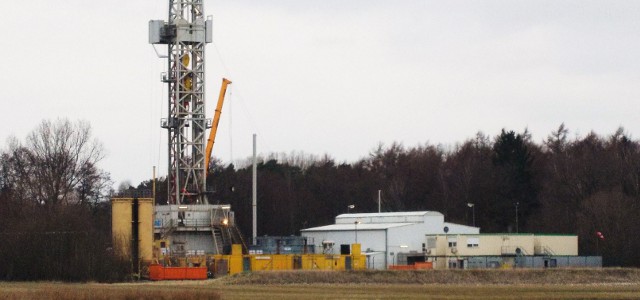Two weeks ago, the German government sent its bill for shale gas production to Parliament for approval. And once again, we read both that Germany has banned and approved fracking. Craig Morris explains what is really going on.

Germany has some conventional gas wells already – but fracking regulations remain politically controversial. (Photo by Battenbrook, CC BY-SA 3.0)
The German stance on shale gas continues to confuse foreign onlookers, but the international press is gradually getting the story right. The title at Reuters probably put it best: “Germany sets very high bar for fracking.”
First, an overview of what was decided – and keep in mind that all of this has remained basically unchanged since we originally reported on the plans last July:
- The burden of proof is on shale gas firms, not the public – if any environmental impacts occur around an exploration site, the firms will have to demonstrate that they did not cause the damage (this stipulation alone is likely to scare off most oil and gas firms (the opposite of what is practiced in the US);
- Fracking for “tight gas” (which has been practiced in Germany for decades) will continue to be allowed;
- Fracking is generally prohibited at depths within 3,000 meters of surface and in areas where groundwater is sensitive (Natura 2000); however, most shale gas in Germany is expected to be found in deeper areas;
- The German states (Länder) will be allowed to further ban fracking in areas of hard coal mining, mainly because of the risk of earthquakes;
- In exceptional cases, fracking can be allowed after a special committee reviews test results of environmental impacts – starting in 2018;
- The law applies up to 2019 and will probably be reviewed for a possible extension.
Again, all of this was expected, and if you wonder why Germany did not simply ban fracking outright, I refer you to my article from February, where I explain that the German government sometimes prefers softer positions to discourage unwanted practices (outright bans sometimes strengthen opposition).
Nonetheless, large industry is not happy about the law. As Reuters reports, German industry lobby group BDI calls the rules “completely over the top.” German utilities association BDEW (press release in German) takes a more moderate position (after all, they not only represent providers of energy, but also of water), explicitly welcoming the legal clarity of the new rules – though the organization does argue that it is unclear how the new rules apply to existing natural gas exploration. Environmental groups are unhappy because there is no complete ban of fracking. Experts at Munich Environmental Institute (press release in German) now hope that the German Parliament will reject the bill.
There may be some wishful thinking going on among those environmentalists, however. Chancellor Merkel’s grand coalition has roughly a three-quarter majority in the Bundestag. For the Parliament to reject the bill, about a third of coalition parliamentarians would have to vote against it – an unlikely level of rebellion. Der Spiegel speaks of “dozens” of parliamentarians who reject the bill, but that number includes Green Party members from the opposition – and the Bundestag has more than 600 members (the largest Parliament in the world), so “dozens” will not get you very far. (The only other party in Parliament, The Left, wants a complete ban on fracking.)
Der Spiegel speculates, however, that “more than 100” Union parliamentarians want stricter regulations. On the other hand, Chancellor Angela Merkel (CDU) and Environmental Minister Barbara Hendricks (SPD) have been discussing these proposals publicly for around nine months, and they probably have their ducks in a row. If anything, expect the bill to be beefed up, not watered down when it passes the Bundestag. And the Bundesrat (the upper chamber of Parliament representing the states) cannot veto the law, according to the Süddeutsche Zeitung, so any changes it requests will only come about because of Germany’s penchant for consensus and compromise. According to staff members in the Bundestag, it is unlikely that Parliament will adopt it as law before early June.
Craig Morris (@PPchef) is the lead author of German Energy Transition. He directs Petite Planète and writes every workday for Renewables International.